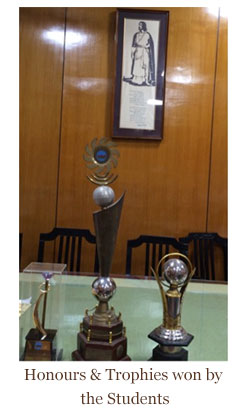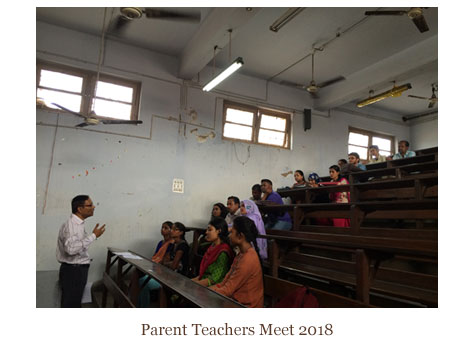
The Department was established in the 1960s, offering Honours and General Courses at the Under Graduate Level. There are four sanctioned Faculty posts. The Department has followed the Annual Examination (Part I, II, & III) under the University of Calcutta till 2018. Since July 2018, the Choice Based Credit System has been introduced, with revised course design (divided into Modules), restructured marking scheme and Semester systems (upto six semesters).
Students have access to Central and Seminar Libraries for recommended readings. The Department prepares an Academic Calendar (in sync with the Academic Calendar of University of Calcutta) for the benefit of the students at the beginning of new session. Students are apprised of the lesson plan, class schedule, allotted teachers, holidays, examination dates and other important information for the whole year. The Department has also initiated dedicated and closed social media groups for each Batch of students for instant communication and intimations. Regular class-tests are conducted for evaluation. Tutorial classes are held after Annual Selection Tests for rigorous mentoring.
Among special initiatives, the Department occasionally encourages Quiz within the classroom on relevant subject and current affairs to generate interest amongst the students. Home assignments are given regularly to help prepare topics and improve writing skills. Students are encouraged to ask questions within and outside classrooms. Scheduled tutorial classes are made interesting through group discussions and debates among the students, under the supervision of the teachers.
B.A. Pol, Sc. (Honours) under CBCS system of CU
Semester wise Course Structure offered by Department
Learning Outcome : View
The Department was established in the 1960s for disseminating comprehensive knowledge about Political Science at the Graduation level. The explicit objective has been promoting higher education and learning in the field and with successive batches of students regularly attending classes and completing the course, this target has been satisfactorily met by the College and Department.
Some of the related learning outcomes for the students have been the following:
An in-depth empirical as well as qualitative understanding of the lively subject of politics for the students which helps them appreciate news reporting, political discussions and debates, domestic and international events.
Inculcates good citizenship values in the students, making them aware of their rights and duties.
The curriculum encourages gender sensitization, religious harmony and through different courses within the subject. Classroom discussions and invited lectures are organized for reinforcing these values. Certain courses on Indian Political History, harping on the ills and trauma of partition, the value of secularism are theoretically discussed to uphold the ethical standards for the students. Also, the student composition reflects two things very clearly; there is a substantial intake of female students every year (almost forty per cent). And, students from all religious communities are part of the classroom.
The Department is committed to the vision and mission of the College and takes special care to teach students from minority communities and other weaker sections. The Department has traditionally witnessed the admission of students of poorer sections in Central Calcutta, which forms the immediate surrounding of the College. To that end, the Department promotes inclusive education, providing equal opportunities to all.
Advanced and interested learners are encouraged by the Department to participate in debates, students' seminars in the College as well as in other institutions. This is very helpful in improving their communicative skills. They regularly contribute to Wall Magazines by writing their thoughts on a relevant issue.
Environmental awareness is specially inculcated among students of the Department by teaching them the history of environmental movements and its present dynamics. Separate assignments and examinations on Environmental Studies are conducted as a part of the Calcutta University academic calendar, which is compulsory for all students.
The Department organizes interesting outreach programs for students as there is appreciation for learning beyond classrooms. These trips are usually visits to places of political relevance within the city like the Legislative Assembly.
Since the initiatives by the MHRD for e-based learning, the Department has been committed to preparing study materials for students which can be made available online. Students are made aware of existing online Journals and E-Books during classroom discussions and encouraged to access them in the College Library.
The Department prepares students for Post-Graduate courses in not just Political Science, but also History, International Relations, Sociology. Legal Studies, Public Administration, Comparative Politics. The courses of the Department are designed and imparted in a way which makes the students both interested, and capable of pursuing these subjects for their Masters.
The students are disciplined to appear for competitive examinations to enter into academic teaching like National Eligibility Test (NET) and State-Level National Eligibility test (SLET). The knowledge gained by them in the three years in crucial for their preparations.
The students are also prepared to undertake competitive courses such as Management and its related fields, Journalism and Law.
The students are aided with the study materials to prepare for Civil Services at the national (UPSC) and regional levels. They feel a competitive edge as prospective candidates due to a strong general knowledge in politics, as well as courses like Indian Political History and Movement, Indian Constitution, Comparative Government and Politics (Foreign Constitutions), International Relations and Public Administration.
Students are capable of pursuing social science research with leading institutions in the country and abroad. Many find appealing academic satisfaction in pursuing field-work based research as the Course impresses upon them the significance of such work for micro-level research.
Students can also involve themselves with non-governmental organizations, contributing to society in a very meaningful way.
Syllabus of Philosophy under CCF-2022 w.e.f. Academic Session 2023-2024 : View
Old syllabus of Calcutta University (1+1+1 Regulations, 2010).: View Syllabus
New CBCS syllabus of Calcutta University : View
Coming Soon
Lesson Plan 19-20 UG: View
Lesson Plan 20-21 UG: View
Lesson Plan 2021 - 22 for Semester 1, 3 & 5 UG: View
Lesson Plan – 2022-23: View




Coming Soon

